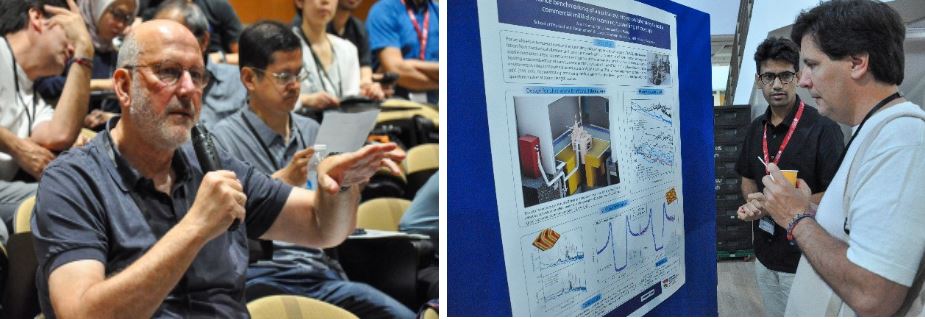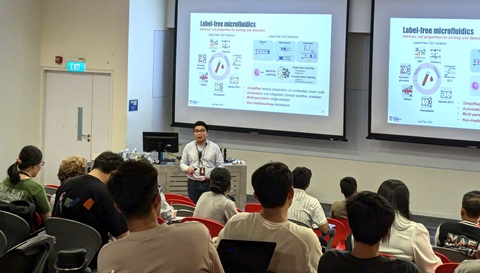ICMAT 2023 Satellite Workshop on Advanced Scanning Probe Methods (ICMAT-ASPM)
Thasneem Aliyar | PhD student, IGP-ERI@N NTU
 Group photo of the ICMAT-ASPM invited speakers and delegates.
Group photo of the ICMAT-ASPM invited speakers and delegates.
Topological and quantum matter, characterised and controlled at the atomic scale, were the focal points of the recent ICMAT 2023 Satellite Workshop on Advanced Scanning Probe Methods (ICMAT-ASPM). The workshop brought together international experts to discuss the latest advancements in scanning probe techniques, particularly in relation to spintronics and quantum information processing.
Held on 30 June 2023 at the NTU School of Physical and Mathematical Sciences (SPMS), the workshop was jointly organised by SPMS and the Materials Research Society of Singapore (MRS-S), with support from the Institute of Advanced Studies (IAS@NTU). It covered a wide range of topics from the properties of atomic-scale magnetic structures to topological / strongly correlated matter and topological superconductivity. The speakers shared their views and breakthroughs on atomic manipulations and atomic-scale lithography, to scanning probe mediated coherent control of atomic-scale quantum systems.
ICMAT-ASPM was able to gather nearly 60 international delegates from ten countries, including the US, Australia, Germany, Korea, Japan, Switzerland, Spain, India and China. The workshop participants, many of them being students, took the opportunity to engage in scientific exchange and satisfy their curiosity on topics of advanced scanning probe microscopy. Lively interactions with the ten invited international speakers fostered and strengthened collaborations with the local research teams.
-.jpg?sfvrsn=c7338b73_10)
Prof Roland Wiesendanger (Hamburg) delivering an outstanding IAS@NTU plenary lecture.
Following a brief welcome address, the event opened with an outstanding IAS@NTU plenary lecture by Prof Roland Wiesendanger (University of Hamburg) on atomically and spin-resolved imaging of magnetic nanostructures by scanning tunneling microscopy (STM). The talk was followed by a lecture on ordered and tunable Majorana lattices in iron-based superconductors by Prof Hong-Jun Gao from the Chinese Academy of Sciences. Dr Yande Que (NTU) then presented recent results on the performance benchmarking of NTU’s recently completed ultra-low vibration (ULV) laboratory for millikelvin scanning tunnelling microscopy (mK-STM), in celebration of which this first ever iteration of ICMAT-ASPM was organised.
After the morning coffee break, the scientific session featured a theory talk on the interplay of superconductivity and disorder and implications on Majorana research by Prof Jelena Klinovaja (University of Basel). Prof Ralph Claessen (Julius-Maximilians University, Würzburg) presented recent results on how to probe orbital angular momentum and Berry curvature by STM. Finally, Prof Michael Fuhrer (Monash University) shared his views on breakdown and restoration of topological protection in magnetic topological insulators.

[Left] Prof Ralph Claessen (Würzburg) participating in the Q&A session.
[Right] Engaging poster presentation and discussion with Prof Miguel Ugeda (Donostia, San Sebastian).
Following the sumptuous lunch buffet and poster session, the second IAS@NTU plenary lecture by Prof Vidya Madhavan (University of Illinois at Urbana Champaign) covered recent research on probe tip tunnelling of spin-polarised electrons from nanowires of the topological Kondo insulator SmB6. The session continued with a diverse range of topics including the interplay between of superconductivity and disorder by Prof Yukio Hasegawa (University of Tokyo), 2D materials and devices by A/Prof Jiong Lu (NUS) and piezoelectricity / ferroelectricity in hexagonal Boron Nitride (hBN) by Dr Colin Robert Woods (NUS).
The final session of the day focused on the engineering and coherent control of atomic-scale quantum systems, with two outstanding talks by speakers from the University of New South Wales (UNSW), Prof Michelle Simmons and Prof Sven Rogge. Prof Simmons presented an informative historical overview of the development of silicon quantum processors by STM lithography. Prof Rogge then presented on silicon-based quantum devices and their atomic-scale investigation by STM. The session concluded with two talks by Dr Soo-Hyong Phark and Ms Hong T Bui, both from the Centre of Quantum Nanoscience (QNS), at the Ewha Woman’s University in Seoul, who introduced the Centre’s groundbreaking research on coherent control of spins on surfaces by STM tip-induced electron spin resonance (ESR).
The event concluded with a poster ceremony, with prizes awarded by the Guest of Honour, Prof Timothy White (President of MRS-S and NTU Vice President, International Engagement). The four poster prizes were sponsored by IAS@NTU and the Institute of Physics’ (IoP) Nano Futures. Ms Hong T. Bui (QNS) secured the first prize by IoP Nano Futures, while Ms Thasneem Aliyar (NTU) was awarded the first prize by IAS@NTU.
 The winners of the poster prizes sponsored by IoP Nano Futures and IAS@NTU, with our Guest of Honour Prof Timothy White (right) and
Nanyang Asst Prof Bent Weber from SPMS (left).
The winners of the poster prizes sponsored by IoP Nano Futures and IAS@NTU, with our Guest of Honour Prof Timothy White (right) and
Nanyang Asst Prof Bent Weber from SPMS (left).
A laboratory tour of NTU’s new ultra-low vibration (ULV) laboratory for millikelvin STM was organised for the invited speakers of ICMAT-ASPM who were impressed by the new research infrastructure and capability.
We extend our gratitude to all the participants, organisers, and generous sponsors for their contributions to make this event a success. It was a truly memorable workshop which we hope to repeat on an annual basis.

The friendly and highly motivated team of organisers and volunteers from NTU’s WeberLab.







